Intergovernmental activity update Q1 2025
This update gives an overview of intergovernmental activity of relevance to the Scottish Parliament between the Scottish Government and the UK Government, the Welsh Government, and the Northern Ireland Executive during quarter one (January to March) of 2025.
Introduction
SPICe publishes quarterly updates to give an overview of intergovernmental activity.
'Intergovernmental activity’ refers to work between governments – in a Scottish context between the Scottish Government and the UK Government or other devolved governments. It can include discussions on areas of mutual interest, policy development, and policy implementation.
Read more about what intergovernmental activity is and why awareness of it is an essential element of parliamentary scrutiny on our SPICe blog. SPICe has also launched an intergovernmental activity hub that collates information on intergovernmental activity of relevance to the Scottish Parliament.
Updates are published on the last Thursday of the month following the end of the reporting period. This update reflects information available at the time of publication.
Highlights
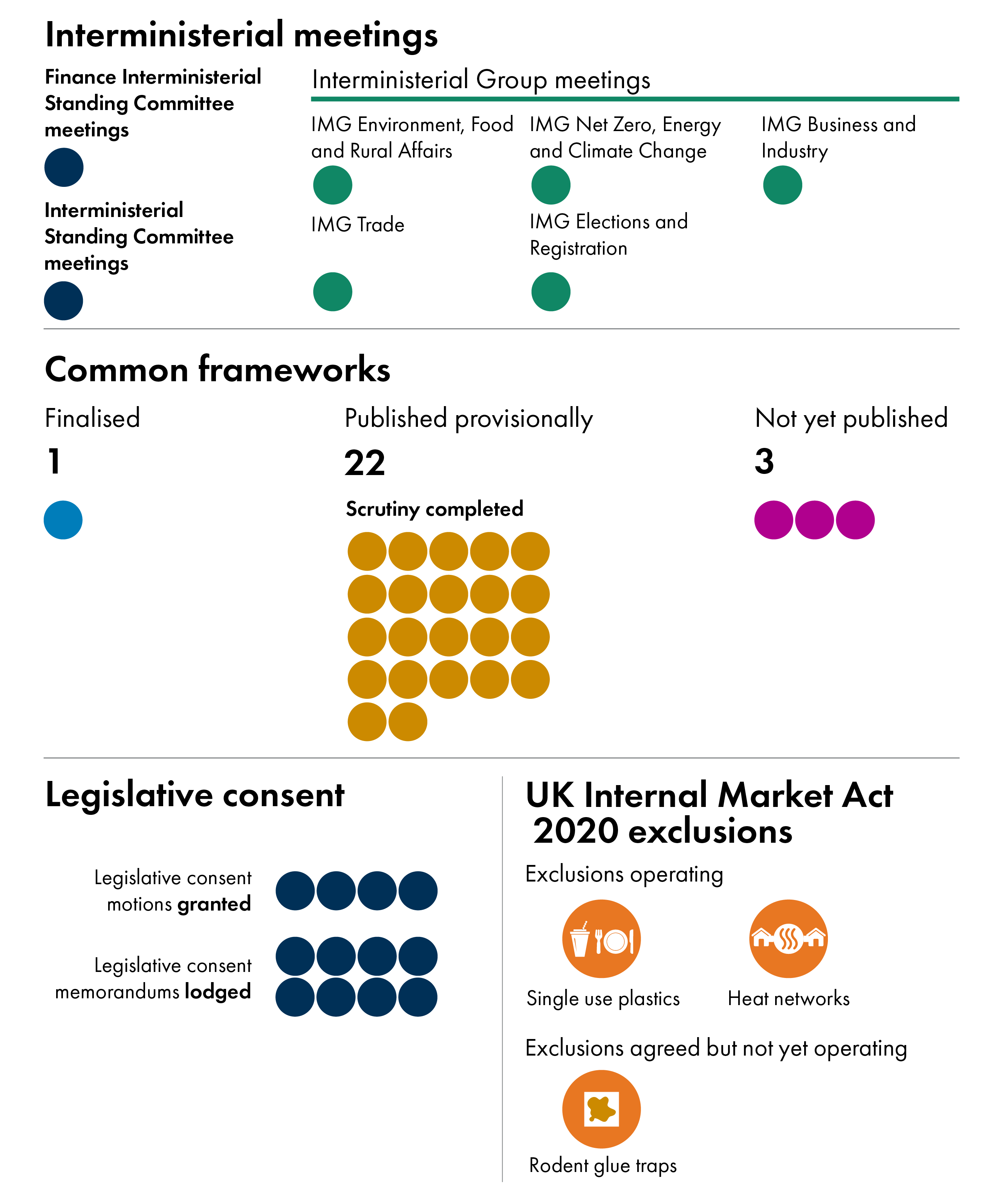
Intergovernmental activity
Formal intergovernmental interactions take place under the following structure, which was established in January 2022.
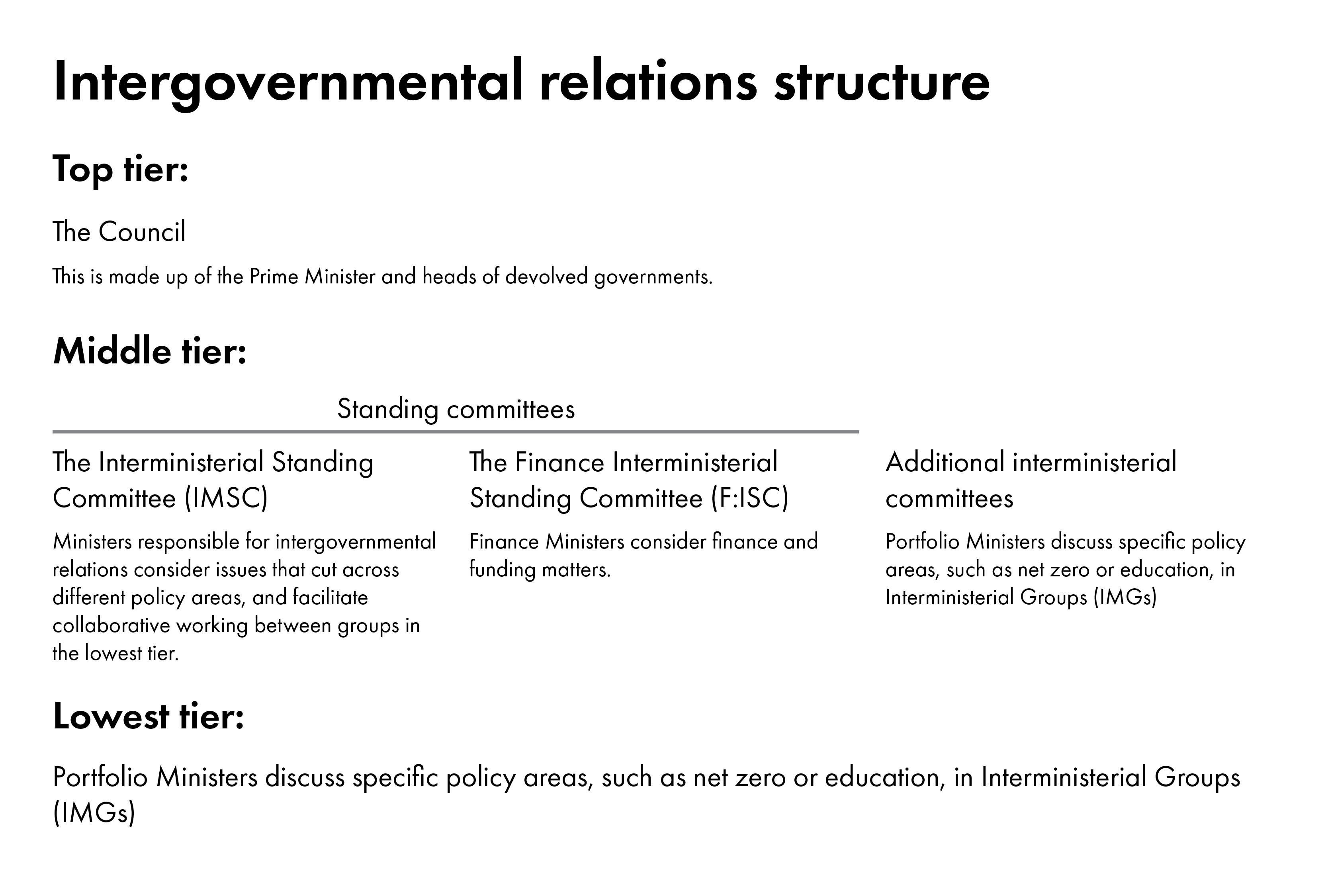
See a SPICe blog for more information on how the new structure operates.
Interministerial meetings
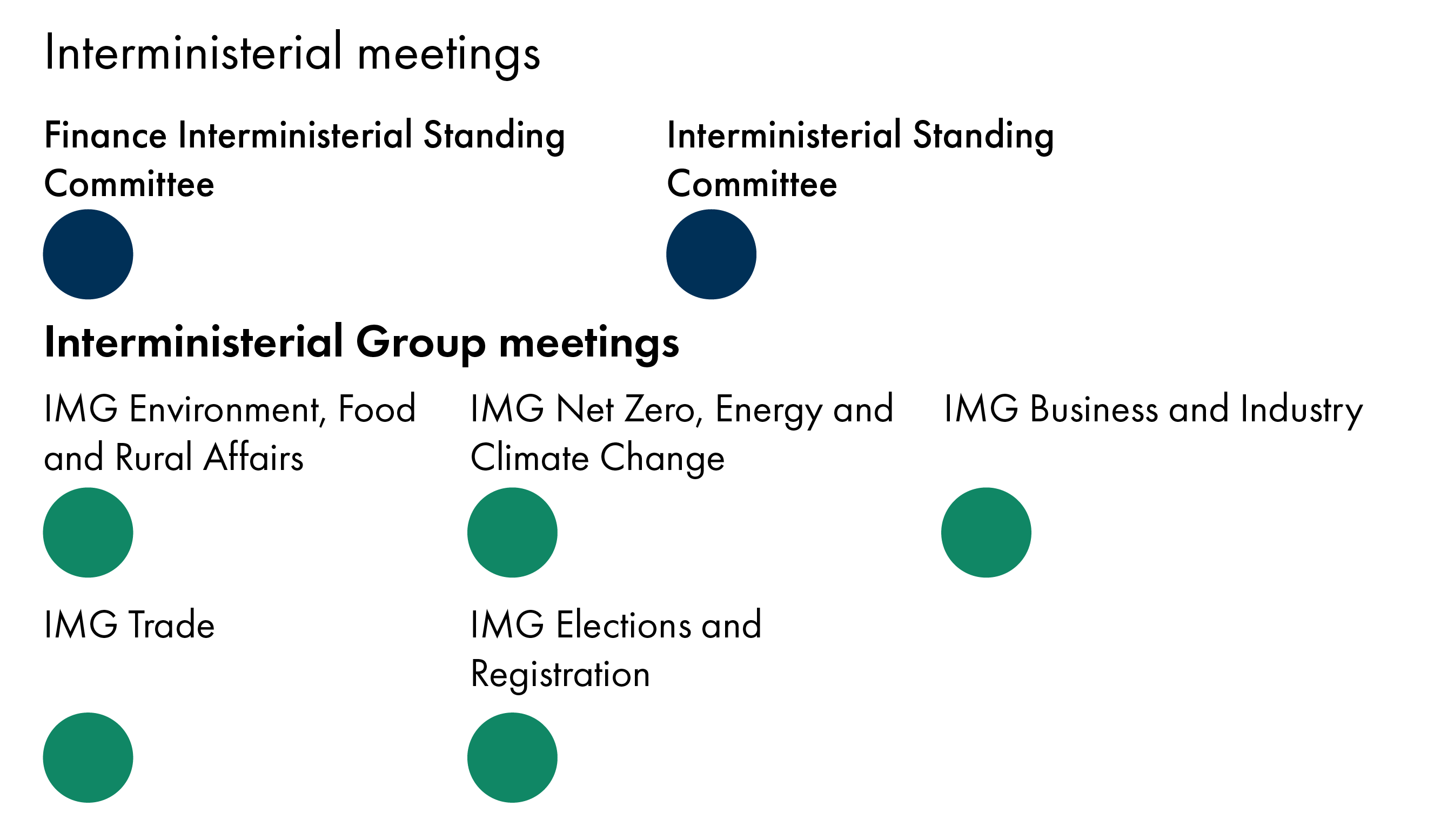
Interministerial Standing Committee
The Interministerial Standing Committee (IMSC) met on 27 February 2025. The meeting was co-chaired by the Northern Ireland Executive First Minister Michelle O’Neill MLA and Deputy First Minister Emma Little-Pengelly MLA. Deputy First Minister and Cabinet Secretary for Economy and Gaelic, Kate Forbes MSP, attended on behalf of the Scottish Government. The other attendees were (from the Welsh Government) Deputy First Minister and Cabinet Secretary for Climate Change and Rural Affairs, Huw Irranca-Davies MS; and (from the UK Government) Chancellor of the Duchy of Lancaster and Minister for Intergovernmental Relations, Rt Hon Pat McFadden MP; Secretary of State for Scotland, Rt Hon Ian Murray MP; and Cabinet Office Parliamentary Secretary, Georgia Gould MP.
The minutes of the meeting record that a wide range of topics were discussed, including: the UK Government's ongoing review of the UK Internal Market Act 2020; the Sewel Convention and UK legislation; the need for the UK and devolved governments to work together to "safeguard assets of national importance, such as in Grangemouth", and to remain engaged on the economic impact of global developments; and shared opportunities and priorities for joint working on the use of technology in public sector reform.
The minutes also state that:
Ministers agreed plans to update understanding of current activity of Interministerial Groups, with a view to ensuring that inter-ministerial engagement operates efficiently and effectively within appropriate structures.
In a letter sent to the Conveners of the Public Audit Committee and the Finance and Public Administration Committee on 24 March 2025, the Deputy First Minister stated that she had "highlighted encouraging examples of the ways digital innovation is improving public services in Scotland", and proposed that the UK and Devolved Governments should "consider joint working arrangements on this topic".
The Deputy First Minister also noted in her letter that:
During the discussion of the Internal Market Act, I expressed the Scottish Government’s dissatisfaction with the scope of the statutory review and the quality of the engagement undertaken by the Department of Business and Trade to date. I reiterated the Scottish Government’s position that the Act be repealed and replaced with a more equitable and workable system. I also noted that the Scottish Government is ready to assist with the development of a Memorandum of Understanding on the Sewel Convention, emphasising that the scope of the renewal should be done in collaboration and agreement with the devolved governments. I reflected on recent positive examples of the approach to legislative consent and was clear that this should be the consistent approach going forward.
Finance: Interministerial Standing Committee
The Finance: Interministerial Standing Committee (F:ISC) met on 27 February 2025. The meeting was attended by Rt Hon Darren Jones MP (Chief Secretary to the Treasury) on behalf of the UK Government; Shona Robison MSP (Cabinet Secretary for Finance and Local Government) on behalf of the Scottish Government; John O’Dowd MLA (Minister of Finance) on behalf of the Northern Ireland Executive; and Rt Hon Mark Drakeford MS (Cabinet Secretary for Finance and Welsh Language) on behalf of the Welsh Government (who also chaired the meeting).
The minutes of the meeting note that “all ministers appreciated the opportunity to discuss economic and fiscal challenges, focusing on their shared ambitions in respect of driving economic growth”. The meeting also included updates from the Finance Ministers from the Scottish and Welsh Governments and the Northern Ireland Executive on their Administrations’ draft 2025-26 budgets.
The minutes also record that:
Ministers shared their priorities as part of the second phase of the UK Spending Review and the upcoming UK Spring Statement on 26 March 2025. All four ministers agreed on the importance of continued collaboration on priorities such as budget flexibility, which are key to driving economic growth and ensuring resources are maximised.
In a letter sent to the Convenor of the Scottish Parliament's Finance and Public Administration Committee on 14 March 2025, the Cabinet Secretary for Finance and Local Government indicated that:
I used this meeting to set out the challenges facing the Scottish Budget and our priorities for the UK Spending Review, highlighting the opportunity that the Spending Review provides for collaboration between the four nations to support economic growth. I highlighted the importance of involving devolved governments in the Spending Review process as this will have a significant impact on our future budget. I also reiterated the need for the UK Government to fully fund the additional cost to public services of the increase in employer National Insurance contributions and made clear that it would not be right for our public services to suffer as a result of this change.
Interministerial Group for Business and Industry
The Interministerial Group for Business and Industry met on 21 January 2025. This was the first meeting of the group since January 2023. According to the minutes of the meeting, the following topics were discussed:
the importance of shared objectives on economic growth and investment
the UK Government's growth mission, modern industrial strategy and a desire to work in partnership to meet its ambitions across the four nations
a commitment to maintaining constructive dialogue through the IMG forum.
In addition, an updated version of the group's Terms of Reference was agreed, which included an agreement to meet quarterly.
Interministerial Group for Trade
The Interministerial Group for Trade met on 22 January 2025. This was the group's first meeting since the UK Parliament election on 4 July 2024 (the last meeting was held in April 2024). The meeting was chaired by Rt Hon Douglas Alexander MP (Minister of State for Trade Policy and Economic Security, UK Government), and was also attended by the UK Government Secretaries of State for Scotland, Wales, and Northern Ireland. The other attendees were: Richard Lochhead MSP, Minister for Business, for the Scottish Government; Rebecca Evans MS, Cabinet Secretary for Economy, Energy and Planning, for the Welsh Government; and Conor Murphy MLA (then Economy Minister), for the Northern Ireland Executive.
According to the minutes of the meeting, the discussion focused on “the UK Government's current trade priorities and the ongoing work creating a UK Trade Strategy”, as well as the UK's trade relationship with the EU and the USA. There was also discussion of the “current standing of the free trade agreement programme”. The minutes also record that Ministers agreed to reconvene quarterly.
In a letter sent to the Convenor of the Scottish Parliament's Economy and Fair Work Committee on 18 February 2025, the Minister for Business provided further information and reflections on the meeting. Mr Lochhead noted that:
I welcomed Mr Alexander's commitment to positive engagement with Devolved Governments and his comments around a new approach to engagement with the EU, while also noting the importance of the USA as a trading partner for Scotland. I also noted that officials have reported more constructive working relationships between the Scottish Government and the Department for Business and Trade over recent months, while recognising that there remains progress to be made.
On the UK Trade Strategy, Minister Alexander provided an overview of each of the key topic areas for inclusion in this strategy. Alongside other Devolved Ministers, I highlighted the significant responsibilities and interests of our Governments in trade policy and delivery, including for example in supporting our businesses to export […] Minister Alexander underlined his commitment to ensuring appropriate involvement of Devolved Governments in the strategy.
Interministerial Group for Environment, Food and Rural Affairs
The Inter-Ministerial Group for Environment, Food and Rural Affairs met on 27 January 2025, and a wide range of topics were discussed.
The group held a “deep dive” on environmental land management, which “brought out some key themes that all four governments were aiming to achieve”: namely, sustainable food production, holistic farm support, and ensuring that environmental outcomes are delivered. To support this, Ministers agreed a number of points on which the Governments would work together and share best practice in future.
The minutes also record that “Devolved Government ministers also shared their disappointment that [UK Government] Treasury ministers had not attended to discuss agricultural funding, as had been requested at the previous IMG”.
Other topics discussed during the meeting included:
The latest work of the UK Government Circular Economy Taskforce, where Ministers “agreed on the importance of the circular economy in achieving economic growth and shared environmental and climate ambitions”.
Bovine electronic identification, where “officials will continue to engage on the implications of technology choices for electronic identification”.
The role and importance of involving the devolved governments in potential negotiations on developing a UK-EU sanitary and phytosanitary agreement, where Ministers agreed to “continue positive engagement at official and ministerial level”.
The development of a UK Government Food Strategy, where Ministers “stressed the importance of respecting devolution in this work” and “agreed to engage and collaborate on this where it was mutually advantageous”.
Updates on the IMG work programme, Common Frameworks finalisation timescales, and animal diseases.
Interministerial Group for Elections and Registration
The Interministerial Group for Elections and Registration met on 12 February 2025. This was the group's first meeting since the UK Parliament election in July 2024 (the last meeting having been held in January 2024).
The meeting was chaired by Rushanara Ali MP, UK Government Minister for Homelessness and Democracy. Also in attendance were Fleur Anderson MP (Parliamentary Under-Secretary of State for Northern Ireland, UK Government) and Jayne Bryant MS (Cabinet Secretary for Housing and Local Government, Welsh Government). Jamie Hepburn MSP, Scottish Government Minister for Parliamentary Business, was unable to attend but Scottish Government officials were in attendance.
The minutes of the meeting record that:
All Ministers agreed that the IMG would be an important forum for continued sharing of information and ideas as the different Governments take forward their elections and registration agendas and recommitted to ensuring regular meetings. Minister Ali reflected that the UK Government is committed to a collaborative approach with colleagues from across the UK, sharing good practice and learning from experiences and different approaches.
The minutes also note that Scottish Government officials “welcomed the progress of the Absent Voting (Elections in Scotland and Wales) Private Members’ Bill”, and that all attendees agreed that “should the legislation succeed, officials should collaborate to implement it as quickly and efficiently as possible”. The minutes also note that Scottish Government officials “highlighted the recently enacted Elections Reform and Representation Act in Scotland”.
Interministerial Group for Net Zero, Energy and Climate Change
The Interministerial Group for Net Zero, Energy and Climate Change met on 6 March 2025. According to the minutes of the meeting:
The Interministerial Group discussed items on biomethane; local energy initiatives and benefits to communities; and also heard an update on the UK's Carbon Budget 7, following the publication of the Climate Change Committee's advice to the UK Government on 26 February 2025.
The minutes also note that the group “considered potential topics for discussion at future meetings and agreed updated Terms of Reference”.
Common frameworks
Common frameworks are intergovernmental agreements which set out how governments will work together to make decisions about policy in certain devolved policy areas, in particular decisions about policy divergence.
Common frameworks were originally intended to be used to consider matters which were former EU competences, however, some also state that they may be used to consider related matters within the wider policy area. You can read more about what common frameworks are on our intergovernmental activity hub.
No new framework agreements were published during the reporting period. The image below provides an update on frameworks relevant to Scotland and scrutiny of frameworks at the Scottish Parliament.
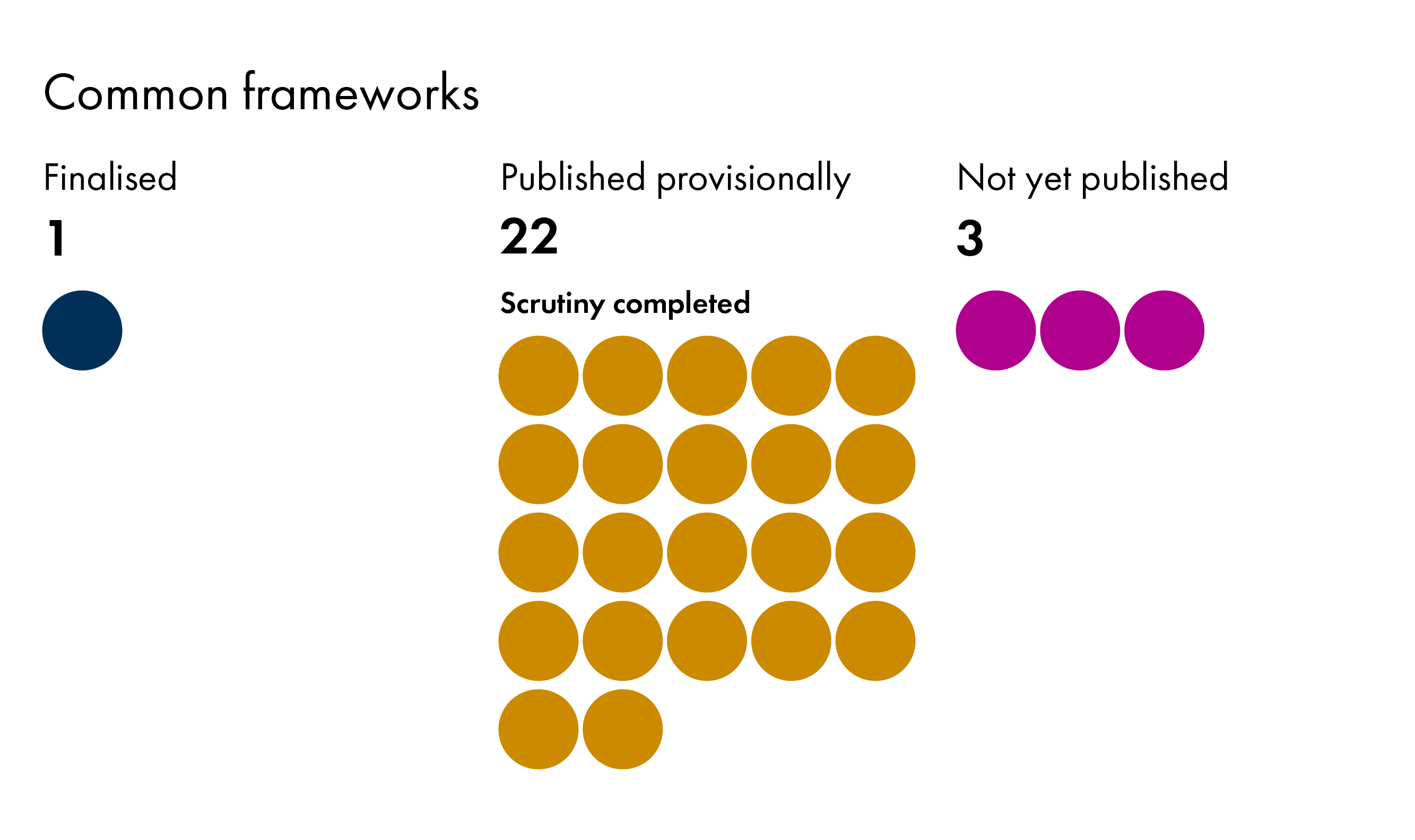
One common framework, Hazardous Substances (Planning), has been finalised. Scrutiny of all currently provisionally published frameworks that apply to Scotland has been completed at the Scottish Parliament. Three more planned frameworks that apply to Scotland – the Zootechnics Framework, the Mutual Recognition of Professional Qualifications Framework, and the Services Directive Framework – remain unpublished.
The UK Government announced in a written statement to the UK Parliament House of Commons on 12 December 2024 that it aimed to finalise the Common Frameworks programme by Easter 2025. The statement also committed to “developing closer working relationships and increased transparency between the Government and the Devolved Governments on UK internal market matters that impact significantly on devolved responsibilities within Common Frameworks”.
The minutes from the meeting of the Interministerial Standing Committee (IMSC) held on 3 December 2024 note that:
The Committee discussed an update on the Common Frameworks Programme, pushing towards conclusion during 2025. Ministers discussed the importance of applying the Common Frameworks principles to enable joint work in good faith. Ministers emphasised that agreement on the approach to the Windsor Framework text in the context of Common Frameworks would be a priority. The importance of an effective Internal Market Act exclusions process to support the operation of Common Frameworks was raised.
UK internal market
The UK Internal Market Act 2020 ('UKIMA') is UK-wide legislation about the flow of goods and services. You can read more about the Act's provisions in our SPICe briefing and a SPICe blog.
UK Government review of the Internal Market Act
UKIMA contains a statutory requirement for a Government review of its provisions to be completed by December 2025. The UK Government announced in a written statement to the UK Parliament House of Commons on 12 December 2024 that it intended to launch the review in January 2025, and that it would be completed by summer 2025 - earlier than the statutory deadline. The written statement indicates:
As a statutory minimum, this review must cover use of the powers in Part 1 (Goods) and Part 2 (Services), including the powers to add, delete or amend exclusions from the scope of the Act, and the arrangements relating to the use of the Office of the Internal Market to perform the functions in Part 4 of the Act (covering independent advice and monitoring of the UK Internal Market) .
However, the Government recognises the importance of fully considering the operation of the Act beyond the narrow statutory requirements. Therefore, the Government will broaden the scope of the review to include the practical operation of parts 1, 2 and 3 of the Act, including inviting views on the process for considering exclusions from the Act, and the role and functions carried out by the Office for the Internal Market as set out in Part 4. We will directly engage the Devolved Governments in conducting the Review.
The UK Government also announced in the written statement that it would deliver a "package of measures to demonstrate a more pragmatic approach" to the management of the UK internal market. One of the commitments in this package is:
Acknowledging the benefits of policy innovation and shared learning on policy development and implementation, while enabling the smooth functioning of the UK internal market.
On 23 January 2025, the UK Government launched a consultation seeking views on the operation of certain aspects of UKIMA as part of the review. The consultation closed on 3 April 2025.
Scottish Parliament debate on UK Internal Market Act
On 19 February 2025, the Scottish Parliament debated a Scottish Government motion relating to the Powers of the Scottish Parliament. This coincided with a Scottish Government press release issued on the same day in which Kate Forbes MSP, Deputy First Minister, “demanded the repeal of the Internal Market Act and the full restoration to the Scottish Parliament of the powers that were removed by the last UK administration”. The release also noted that MSPs had previously voted to call for the repeal of UKIMA in October 2023.
The following Scottish Government motion was passed by 73 votes to 47:
That the Parliament notes the publication of the UK Government’s consultation and review of the United Kingdom Internal Market Act 2020, which sets out that it will “not consider whether to repeal the UK Internal Market Act or any part of it”; recalls that both the Scottish Parliament and Welsh Senedd refused to give the Act legislative consent; notes the position of the Welsh Government, which opposes the Act, believing it to be “an unwarranted attack on devolution”; reaffirms its decision regarding the Act on 3 October 2023, and calls for it to be repealed.
Office of the Internal Market publications
The Office of the Internal Market (OIM) is part of the Competition and Markets Authority. It monitors and supports the operation of the UK's internal market, and provides expert and independent advice to the UK Government and Devolved Governments on how specific laws and policies affect the UK's internal market.
On 12 February 2025, the OIM published a report on the impact of Single-Use Plastic (SUP) restrictions on the UK internal market, following a review into the effects of SUP regulations since 2011. The report found that the overall effects on intra-UK trade have been “modest” (in the context of the current broad alignment in regulations across Great Britain), and that Governments across the UK “are working effectively together” on SUP restrictions (including using Common Frameworks to manage proposals for new regulations). The report also highlighted a preference among businesses of all sizes for alignment of regulations “both across the UK, and (where businesses sell into the EU and/or rely on EU supply chains) with EU regulations”.
On 31 March 2025, the OIM published three further documents:
its Third Annual Report, setting out developments in the UK Internal Market between April 2024 and March 2025
its response to the UK Government’s consultation on the operation of certain aspects of UKIMA as part of the review of the Act
an interactive dashboard of regulatory developments in the UK internal market, showing potential regulatory differences that the OIM is tracking.
The Annual Report found that “the operation of the UK internal market is stable”, with “no evidence of a substantial adverse impact on trade arising from regulatory developments across the nations”. It suggested that there had been a “slowing down” of regulatory developments and new potential regulatory differences over the period the report covers. The report also presented updated data on intra-UK trade.
The OIM's response to the UKIMA consultation highlighted conclusions from its work to date, in particular relating to UKIMA's market access principles (MAPs) for goods. It noted that there appears to be “limited appetite” among businesses to use the MAPs to help navigate regulatory differences between UK nations, and that some businesses had expressed concern that relying on the MAPs may “damage their relationship” with one or more governments.
Windsor Framework Review
On 9 January 2025, the Secretary of State for Northern Ireland, Rt Hon Hilary Benn MP, commissioned an Independent Review of the Windsor Framework. The Framework is an agreement between the UK Government and the European Commission which makes changes to the operation of the Northern Ireland Protocol (which set out Northern Ireland's post-Brexit relationship with the EU and Great Britain as part of the UK's exit from the EU). This SPICe blog from March 2023 sets out more detail about the Framework and its implications for Scotland.
The commissioning of the Independent Review followed a vote on the continued application of articles 5 to 10 of the Windsor Framework in the Northern Ireland Assembly on 10 December 2024, which passed with the votes of a majority of Members of the Legislative Assembly but not with cross-community support. According to the Review's Terms of Reference, its purpose is:
To provide the Government with a report of its conclusions on the functioning of the Windsor Framework arrangements and its implications on social, economic and political life in Northern Ireland.
The Review is being led by the Rt Hon Lord Murphy of Torfaen. The report must be provided to the UK Government within 6 months of the launch of the Review. A call for written feedback is being conducted as part of the Review until 31 May 2025, inviting stakeholders to share their insights, experiences, comments or concerns.
UK Internal Market Act exclusions
A process has been established by which the UK Government and devolved governments can consider exclusions to the market access principles of the UK Internal Market Act 2020 ('UKIMA'). Read more about the interaction between the exclusions process and common frameworks in our SPICe blog from March 2023.
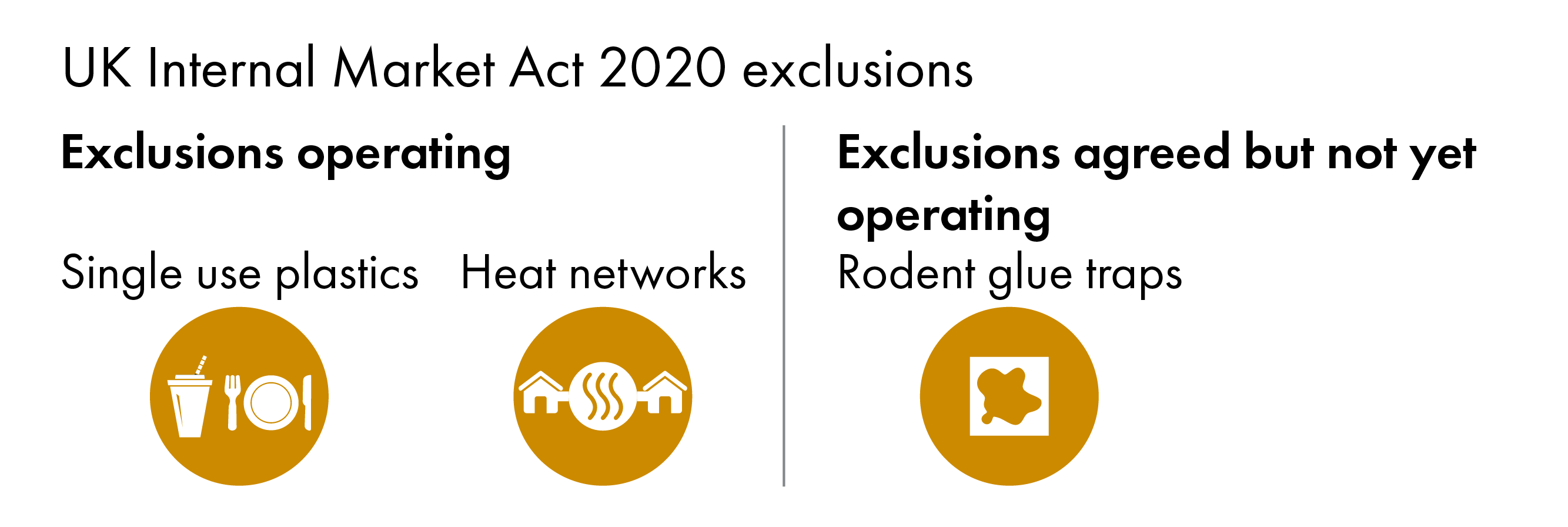
Deposit Return Scheme
Discussions about a UKIMA exclusion relating to a Scottish Deposit Return Scheme (DRS) for drinks containers took place during 2023. The UK Government offered a temporary, narrower exclusion than the one requested by the Scottish Government, which the Scottish Government cited as the reason for its delay of the scheme. See SPICe blogs from 2023 for background about the scheme and further information about intergovernmental discussions regarding an exclusion.
Following the UK Government's exclusion decision, the Scottish Government said it would align its scheme with UK-wide DRS plans. The UK Government, Scottish Government, Welsh Government and Northern Ireland Department of Agriculture, Environment and Rural Affairs agreed in an April 2024 joint policy statement to launch three distinct but interoperable deposit return schemes covering the whole of the UK in October 2027. However, the Welsh Government subsequently announced in November 2024 that it would not proceed with the joint process and would instead pursue its own scheme that includes glass. See previous intergovernmental activity updates for a summary of relevant developments that took place in 2024.
On 16 January 2025, the UK Parliament approved the Draft Deposit Scheme for Drinks Containers (England and Northern Ireland) Regulations 2024, which establish a scheme for drinks containers in England and Northern Ireland. Guidance published by the UK Government on 27 January 2025 sets out more detail about the scope of the scheme and the responsibilities it will place on suppliers, producers and retailers. It also indicated that it expected a scheme administrator (or “deposit management organisation”) to be appointed in April 2025.
The Scottish Government has indicated that it will legislate separately to implement a DRS scheme in Scotland, and would “give effect to the policy positions set out in the Joint Policy Statement, once the UK Government has passed their legislation”. The Acting Minister for Climate Action, Alasdair Allan, said on 20 March 2025 that:
The Scottish Government remains committed to delivering an interoperable deposit return scheme with England and Northern Ireland in 2027 and continues to move ahead with preparations. We have received an industry-backed application to run Scotland's DRS as well as the scheme in England and Northern Ireland. We are currently assessing the application jointly with the UK Government and Northern Ireland […] Any appointment will be announced once the assessment concludes, which we expect to be in April.
Glue traps
The Wildlife Management and Muirburn (Scotland) Act 2024 provides for bans on the purchase, sale, and use of glue traps. The Q1 2024 intergovernmental activity update and SPICe briefing on the Bill ahead of Stage 3 debate summarise the discussions about glue traps and a potential UKIMA exclusion during the then Bill's parliamentary process.
The previous UK Government did not agree to a UKIMA exclusion. In a March 2024 letter to Rt Hon Steve Barclay MP (then-Secretary of State for Environment, Food and Rural Affairs), Shona Robison MSP (then Deputy First Minister and Cabinet Secretary for Finance) noted the UK Government's view that:
The UK Government does not consider that the evidence presented demonstrates that a ban on the sale of glue traps would be substantially more effective than a ban focused on their use and possession. Therefore, the UK Government does not believe that an exclusion under the UKIM Act is necessary to achieve the policy aims of restricting the use of these traps in Scotland.
In response, Shona Robison MSP stated that:
It is not credible to claim that this decision is intended to avoid trade barriers and unnecessary disruption of economic and trade flows, given that in this case, the trade and economic impact is negligible to non-existent.
In a written statement to the House of Commons on 12 December 2024 announcing the UK Government's review of the UK Internal Market Act, Rt Hon Douglas Alexander MP (Minister of State at the Cabinet Office) indicated that the UK Government would take forward “an initial package of measures to demonstrate a more pragmatic approach" to the management of the UK internal market. The statement noted that this package would include:
Agreeing an exclusion from the UK Internal Market Act's market access principles regarding the sale of rodent glue traps, in response to the Scottish Government's previous proposal, as this Government recognises this proposal has a minimal economic impact on trade within the UK.
In its UKIMA Review consultation document, published on 23 January 2025, the UK Government reiterated this commitment, saying that it would make:
A UK Internal Market Act exclusion for legislation in response to the Scottish Government's previous proposal that prohibits the sale of rodent glue traps, so that they would no longer be subject to the market access principles in the Act which provide for the free movement of goods provisions.
Disposable vapes
Following a joint consultation by the UK, Scottish and Welsh Governments in 2023, the Scottish Government announced in February 2024 that it planned to ban the sale and supply of disposable vapes in Scotland from April 2025. The Scottish Government laid the draft Environmental Protection (Single-use Vapes) (Scotland) Regulations 2024 on 10 June 2024. The Regulations were subsequently made on 1 October 2024 and were due to come into force on 1 April 2025.
UK Ministers laid the draft Environmental Protection (Single-use Vapes) (England) Regulations 2024 in the UK Parliament on 23 October 2024. The Regulations proposed a ban on the sale of single-use vapes in England from 1 June 2025. Following the introduction of the draft regulations for England, the Scottish Government announced that it would delay the ban on disposable vapes in Scotland. The Cabinet Secretary for Health and Social Care, Neil Gray MSP, stated:
We will lay regulations to amend the current coming into force date from 1 April 2025 to 1 June 2025 to ensure a common date across the four nations.
On 7 February 2025, Scottish Ministers laid the Environmental Protection (Injurious Articles) (Fixed Penalty Notices and Miscellaneous Amendments) (Scotland) Regulations 2025 before the Scottish Parliament. Among other provisions, these Regulations implement the delay to the ban on disposable vapes. The Regulations were considered by the Net Zero, Energy and Transport Committee on 4 March 2025 and came into force on 31 March 2025.
Chemicals
The UK Government has indicated its intention to consult on how best to safeguard the UK internal market, including the possibility of adopting a consistent approach across the UK, in relation to the classification, labelling and packaging regimes for chemicals.
This followed a formal request (under the so-called “Stormont Brake”) by unionist parties in Northern Ireland to prevent the implementation of an update to EU chemicals rules which would have applied in Northern Ireland (but not Great Britain) under the terms of the Windsor Framework. On 20 January 2025, the Secretary of State for Northern Ireland, Rt Hon Hilary Benn MP, rejected this request but – in a written statement to the House of Commons – stated that the UK Government would:
take the steps necessary to avoid new barriers arising within the UK internal market through our classification, labelling and packaging regimes for chemicals. As part of this, the Government will explicitly consult on applying a consistent regime across the United Kingdom, should this be required to safeguard the UK internal market.
In a letter to the Speaker of the Northern Ireland Assembly, Edwin Poots MLA, on 20 January 2025, the Secretary of State said the UK Government “intends to launch this consultation as soon as possible”.
Legislative consent
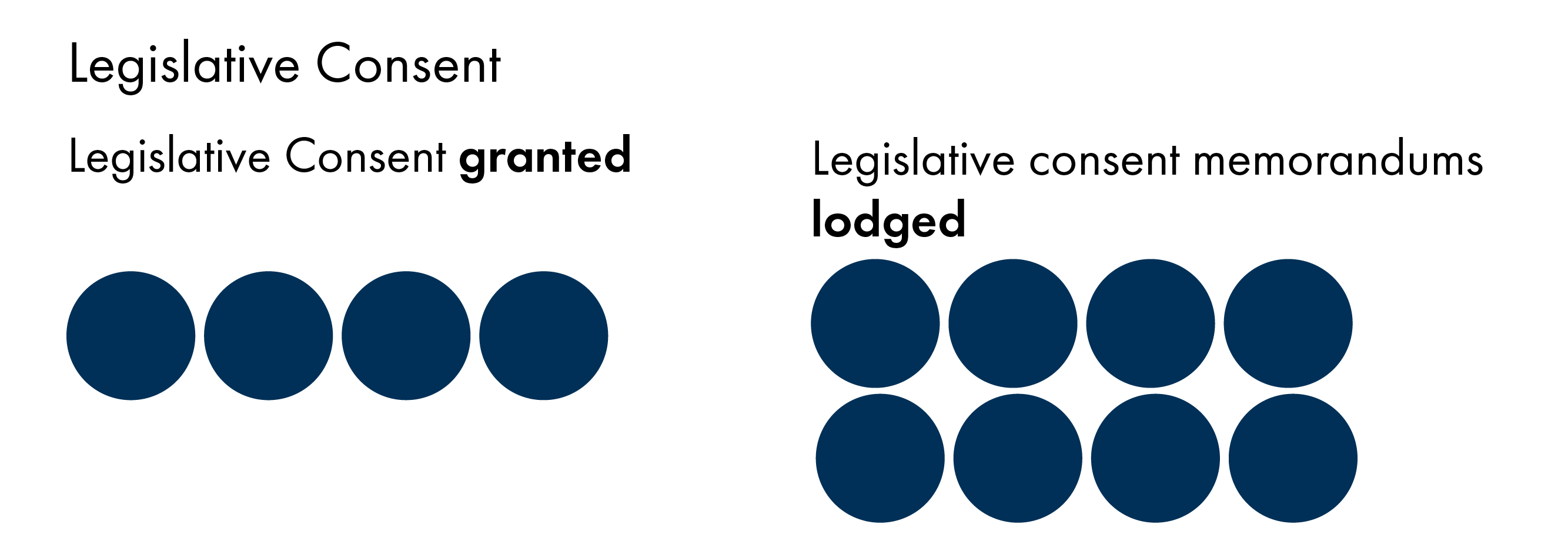
According to the Sewel Convention, the UK Parliament will not normally legislate on devolved matters without the consent of the Scottish Parliament. The Scottish Parliament’s standing orders set down rules which apply where UK primary legislation requires the Parliament’s consent under the Sewel Convention. They apply where UK primary legislation makes ‘relevant provision’, which means provision which applies to Scotland in any of the following ways:
for any purpose within the legislative competence of the Scottish Parliament
to alter the legislative competence of the Scottish Parliament
to alter the executive competence of the Scottish Ministers.
When any of the criteria on relevant provision are fulfilled, a member of the Scottish Government is obliged to lodge a legislative consent memorandum. A legislative consent memorandum, amongst other things, sets out the Scottish Government's view on whether the Parliament should grant legislative consent.
Following the lodging of a legislative consent memorandum, members of the Scottish Parliament may vote on a motion on legislative consent to grant or withhold consent for the Bill.
Find out more about legislative consent on the Scottish Parliament's website.
During quarter one of 2025, the Scottish Government lodged eight legislative consent memorandums in relation to six Bills (five of which were supplementary memorandums).
| Bill title | Date memorandum lodged | Consent recommendation by Scottish Government |
|---|---|---|
| Great British Energy Bill – supplementary memorandum | 28 January 2025 | Consent recommended |
| Great British Energy Bill – second supplementary memorandum | 17 February 2025 | Consent recommended |
| Great British Energy Bill – third supplementary memorandum | 24 February 2025 | Consent recommended |
| Product Regulation and Metrology Bill – supplementary memorandum | 3 March 2025 | Consent not recommended |
| Border Security, Asylum and Immigration Bill | 12 March 2025 | Consent recommended |
| Public Authorities (Fraud, Error and Recovery) Bill | 21 March 2025 | Partial consent recommended (i.e. consent to some provisions, with the Scottish Government “still to reach a position on consent” on others) |
| Planning and Infrastructure Bill | 27 March 2025 | Partial consent recommended (i.e. consent to some, but not all, relevant provisions) |
| Tobacco and Vapes Bill – supplementary memorandum | 28 March 2025 | Consent recommended |
Four legislative consent motions were considered by the Parliament, relating to two Bills.
| Bill title | Date motion considered | Consent decision |
|---|---|---|
| Great British Energy Bill (original and first supplementary memorandum) | 6 February 2025 | Consent granted |
| Renters’ Rights Bill | 19 February 2025 | Consent granted |
| Great British Energy Bill (second supplementary memorandum) | 20 February 2025 | Consent granted |
| Great British Energy Bill (third supplementary memorandum) | 25 February 2025 | Consent granted |
Further information
Information within this intergovernmental update is primarily based on the following sources:
The UK Government intergovernmental relations website contains minutes of interministerial groups and standing committees. Minutes of other intergovernmental meetings are not currently published and hence are not reflected in this update.
The UK Government common frameworks website contains common framework agreements.
The Scottish Parliament legislative consent website lists legislative consent memorandums and associated motions.
Further information on intergovernmental activity can be found on our intergovernmental activity hub and:
House of Commons Library briefing on intergovernmental relations
UK Government transparency reports on intergovernmental relations
Senedd Legislation, Justice and Constitution Committee Monitoring reports
Northern Ireland Assembly Brexit and Beyond newsletters.